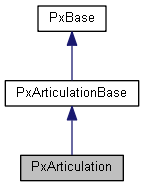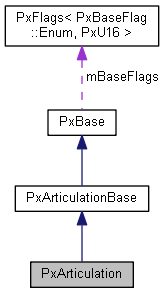a tree structure of bodies connected by joints that is treated as a unit by the dynamics solver
More...
|
| virtual void | release ()=0 |
| | Releases the PxBase instance, please check documentation of release in derived class. More...
|
| |
| virtual void | setMaxProjectionIterations (PxU32 iterations)=0 |
| | sets maxProjectionIterations. More...
|
| |
| virtual PxU32 | getMaxProjectionIterations () const =0 |
| | gets maxProjectionIterations. More...
|
| |
| virtual void | setSeparationTolerance (PxReal tolerance)=0 |
| | sets separationTolerance. More...
|
| |
| virtual PxReal | getSeparationTolerance () const =0 |
| | gets separationTolerance. More...
|
| |
| virtual void | setInternalDriveIterations (PxU32 iterations)=0 |
| | sets the number of iterations used to compute the drive response to internal forces More...
|
| |
| virtual PxU32 | getInternalDriveIterations () const =0 |
| | gets internal driveIterations. More...
|
| |
| virtual void | setExternalDriveIterations (PxU32 iterations)=0 |
| | sets the number of iterations for drive response to external forces. More...
|
| |
| virtual PxU32 | getExternalDriveIterations () const =0 |
| | gets externalDriveIterations. More...
|
| |
| virtual PxArticulationDriveCache * | createDriveCache (PxReal compliance, PxU32 driveIterations) const =0 |
| | create a drive cache for applying impulses which are propagated to the entire articulation More...
|
| |
| virtual void | updateDriveCache (PxArticulationDriveCache &driveCache, PxReal compliance, PxU32 driveIterations) const =0 |
| | update a drive cache More...
|
| |
| virtual void | releaseDriveCache (PxArticulationDriveCache &driveCache) const =0 |
| | release a drive cache More...
|
| |
| virtual void | applyImpulse (PxArticulationLink *link, const PxArticulationDriveCache &driveCache, const PxVec3 &linearImpulse, const PxVec3 &angularImpulse)=0 |
| | apply an impulse to an entire articulation More...
|
| |
| virtual void | computeImpulseResponse (PxArticulationLink *link, PxVec3 &linearResponse, PxVec3 &angularResponse, const PxArticulationDriveCache &driveCache, const PxVec3 &linearImpulse, const PxVec3 &angularImpulse) const =0 |
| | determine the effect of applying an impulse to an entire articulation, without applying the impulse More...
|
| |
| virtual PxScene * | getScene () const =0 |
| | Retrieves the scene which this articulation belongs to. More...
|
| |
| virtual void | setSolverIterationCounts (PxU32 minPositionIters, PxU32 minVelocityIters=1)=0 |
| | Sets the solver iteration counts for the articulation. More...
|
| |
| virtual void | getSolverIterationCounts (PxU32 &minPositionIters, PxU32 &minVelocityIters) const =0 |
| | Retrieves the solver iteration counts. More...
|
| |
| virtual bool | isSleeping () const =0 |
| | Returns true if this articulation is sleeping. More...
|
| |
| virtual void | setSleepThreshold (PxReal threshold)=0 |
| | Sets the mass-normalized energy threshold below which an articulation may go to sleep. More...
|
| |
| virtual PxReal | getSleepThreshold () const =0 |
| | Returns the mass-normalized energy below which an articulation may go to sleep. More...
|
| |
| virtual void | setStabilizationThreshold (PxReal threshold)=0 |
| | Sets the mass-normalized kinetic energy threshold below which an articulation may participate in stabilization. More...
|
| |
| virtual PxReal | getStabilizationThreshold () const =0 |
| | Returns the mass-normalized kinetic energy below which an articulation may participate in stabilization. More...
|
| |
| virtual void | setWakeCounter (PxReal wakeCounterValue)=0 |
| | Sets the wake counter for the articulation. More...
|
| |
| virtual PxReal | getWakeCounter () const =0 |
| | Returns the wake counter of the articulation. More...
|
| |
| virtual void | wakeUp ()=0 |
| | Wakes up the articulation if it is sleeping. More...
|
| |
| virtual void | putToSleep ()=0 |
| | Forces the articulation to sleep. More...
|
| |
| virtual PxArticulationLink * | createLink (PxArticulationLink *parent, const PxTransform &pose)=0 |
| | adds a link to the articulation with default attribute values. More...
|
| |
| virtual PxU32 | getNbLinks () const =0 |
| | returns the number of links in the articulation More...
|
| |
| virtual PxU32 | getLinks (PxArticulationLink **userBuffer, PxU32 bufferSize, PxU32 startIndex=0) const =0 |
| | returns the set of links in the articulation More...
|
| |
| virtual void | setName (const char *name)=0 |
| | Sets a name string for the object that can be retrieved with getName(). More...
|
| |
| virtual const char * | getName () const =0 |
| | Retrieves the name string set with setName(). More...
|
| |
| virtual PxBounds3 | getWorldBounds (float inflation=1.01f) const =0 |
| | Retrieves the axis aligned bounding box enclosing the articulation. More...
|
| |
| virtual PxAggregate * | getAggregate () const =0 |
| | Retrieves the aggregate the articulation might be a part of. More...
|
| |
| virtual PxArticulationImpl * | getImpl ()=0 |
| |
| virtual const PxArticulationImpl * | getImpl () const =0 |
| |
| virtual | ~PxArticulationBase () |
| |
| virtual PxArticulationJointBase * | createArticulationJoint (PxArticulationLink &parent, const PxTransform &parentFrame, PxArticulationLink &child, const PxTransform &childFrame)=0 |
| |
| virtual void | releaseArticulationJoint (PxArticulationJointBase *joint)=0 |
| |
| virtual const char * | getConcreteTypeName () const =0 |
| | Returns string name of dynamic type. More...
|
| |
| template<class T > |
| T * | is () |
| |
| template<class T > |
| const T * | is () const |
| |
| PX_FORCE_INLINE PxType | getConcreteType () const |
| | Returns concrete type of object. More...
|
| |
| PX_FORCE_INLINE void | setBaseFlag (PxBaseFlag::Enum flag, bool value) |
| | Set PxBaseFlag. More...
|
| |
| PX_FORCE_INLINE void | setBaseFlags (PxBaseFlags inFlags) |
| | Set PxBaseFlags. More...
|
| |
| PX_FORCE_INLINE PxBaseFlags | getBaseFlags () const |
| | Returns PxBaseFlags. More...
|
| |
| virtual bool | isReleasable () const |
| | Whether the object is subordinate. More...
|
| |
a tree structure of bodies connected by joints that is treated as a unit by the dynamics solver
Articulations are more expensive to simulate than the equivalent collection of PxRigidDynamic and PxJoint structures, but because the dynamics solver treats each articulation as a single object, they are much less prone to separation and have better support for actuation. An articulation may have at most 64 links.
- See also
- PxArticulationJoint PxArticulationLink PxPhysics.createArticulation




 Public Member Functions inherited from PxArticulationBase
Public Member Functions inherited from PxArticulationBase Public Member Functions inherited from PxBase
Public Member Functions inherited from PxBase Protected Member Functions inherited from PxArticulationBase
Protected Member Functions inherited from PxArticulationBase Protected Member Functions inherited from PxBase
Protected Member Functions inherited from PxBase Public Attributes inherited from PxArticulationBase
Public Attributes inherited from PxArticulationBase Protected Attributes inherited from PxBase
Protected Attributes inherited from PxBase